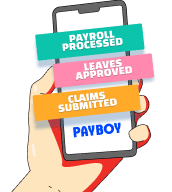Employee bonuses are a great way to say thanks to your staff for all their hard work. But what's the best way to go about it?
In this guide, we'll give you advice on the most common types of bonuses and whether they are subject to CPF so that you can make an informed decision. Read on to find out more!
1. Annual Wage Supplement (AWS), or 13th month bonus
The AWS (or 13th month bonus) is a one-month bonus given to employees at the end of the year.
Is the 13th month bonus compulsory in Singapore?
The 13th month bonus is not compulsory in Singapore and some companies may have specific criteria for determining eligibility for receiving a 13th month bonus, such as meeting performance goals or being employed for a certain period of time.
Tip: If you are considering offering AWS to your employees, head over to our comprehensive Annual Wage Supplement (AWS) guide in Singapore to learn more about AWS eligibility, calculations, taxation, and more.
2. Performance bonus
A performance bonus, also known as a performance incentive or performance pay, is a form of compensation that rewards an employee for exceeding expectations in their job performance. This bonus can be given on top of their regular salary and may be based on individual performance or company-wide accomplishments.
Some potential benefits of offering a performance bonus are:
- Improved performance and productivity - performance bonuses provide an added incentive for employees to work harder and strive for success in their roles. This can lead to increased output and better overall performance for the company.
- Enhanced employee satisfaction and motivation - receiving performance bonuses can make employees feel recognized and valued for their hard work, which can improve job satisfaction and motivation levels.
- Attracting top talent - offering performance bonuses can make a company more attractive to potential job candidates, as it shows a focus on rewarding excellent performance.
- Improved retention rates - providing performance bonuses can also encourage employees to stay with the company, as they know their hard work will be acknowledged and rewarded.
Overall, performance bonuses have the potential to positively impact a company's performance and success. However, it is important for companies to clearly define what performance criteria will qualify for a bonus and ensure fair distribution among employees.
3. Sign-on bonus
A sign-on bonus is a sum of money given to a new employee as an incentive for joining a company. It is typically given at the beginning of employment and may be part of the overall compensation package. Some sign-on bonuses are one-time offers, while others may be given in installments over time.
Sign-on bonuses can vary greatly in amount depending on factors such as the industry, level of experience required for the position, and current demand for talent. A sign-on bonus may also be used to make up for a lower salary offer.
It is important for companies to consider any conditions or restrictions that may be attached to the sign-on bonus. For example, an employee will be given a required length of employment or repayment if he/she leaves the company within a certain time frame.
4. Referral bonus
A referral bonus, also known as a referral incentive or referral program, is a sum of money given to an employee for successfully referring a candidate who is hired by the company. Referral bonuses vary in amount and may depend on the candidate's job level or salary.
Referral bonuses can serve as an effective recruiting tool for companies looking to tap into their employees' networks and bring in high-quality candidates. They also provide added motivation for employees to refer individuals they know would be a good fit for the company.
5. Retention bonus
A retention bonus is offered to employees to encourage them to stay with the company for a certain period of time. This type of bonus may be given as a lump sum or in periodic payments, and is often tied to performance goals or specific milestones.
Retention bonuses can help companies retain valuable talent and reduce turnover costs. However, it is important for employers to carefully consider who should receive these bonuses and how they align with overall business goals.
Ultimately, retention bonuses can be a useful tool for keeping top performers on board, but should not be relied upon as the sole means of retention. It's important for employers to also focus on creating a positive work environment and offering opportunities for growth and development in order to truly retain talented people!
6. Variable bonus
A variable bonus is a type of bonus payment that fluctuates based on certain performance metrics or criteria, such as individual or company performance, sales targets, or profitability. Unlike fixed bonuses, which are predetermined and consistent, variable bonuses can vary in amount from year to year, depending on the achievement of specific goals or objectives.
Variable bonuses, often tied to individual or company performance metrics, incentivize employees to excel in their roles and contribute to the organisation's success. They provide motivation, encourage productivity, and foster a culture of achievement within the workforce.
7. Year-end bonus
A year-end bonus, also known as an annual bonus, is a lump sum payment typically awarded to employees at the end of the fiscal year or calendar year. This bonus is often a discretionary payment made by employers to recognise and reward employees for their contributions throughout the year. Year-end bonuses can be based on various factors, including individual performance, company profitability, or overall business success.
Year-end bonuses reward employees for their hard work and dedication throughout the year, boosting morale and loyalty. Overall, this bonus plays integral roles in driving employee engagement, satisfaction, and overall organisational performance.
8. Ex-gratia bonus
“Ex-gratia” means “by favour” or “by virtue of grace” in Latin. An ex-gratia payment is one made voluntarily by an organisation (employer, government agency, or insurer) to an individual.
Ex-gratia payments are usually discretionary and made voluntarily by employers as acts of goodwill or in exceptional circumstances such as redundancy, termination, or other situations in which the employee may face financial hardship.
Tip: Discover more about our ex-gratia payment guide in Singapore, covering their definition, nuances, and tax and CPF implications.
9. Employee stock options
Employee stock options are a form of employee compensation in which the employee is granted the right to purchase company stock at a set price, known as the exercise price, within a specified time period. This can serve as a bonus or incentive for employee performance and loyalty.
Some potential benefits of giving out employee stock options are:
- Gives employees ownership in the company - First, employee stock options give employees ownership in the company and align their financial interests with that of the company's success. This can create a sense of loyalty and drive employee performance.
- Attract and retain top talents - Furthermore, employee stock options can also serve as a way to attract and retain top talents in a competitive job market.
- Does not require an immediate cash outlay - On the financial side, offering employee stock options does not require an immediate cash outlay as compared to giving out bonuses.
However, designing an Employee Stock Ownership Plan (ESOP) can be complex. You need to also consider some of these potential challenges:
- Communication: It can be difficult to clearly communicate the benefits and responsibilities of ESOP participation to employees.
- Employee buy-in: Not all employees may see the value in owning a stake in the company or may not want to take on additional financial responsibility.
- Legal considerations: ESOPs involve complying with a variety of laws and regulations, including those related to securities, tax, and labor.
- Funding: ESOPs typically require significant financial resources, both for initial set-up costs and ongoing expenses such as administrative fees and purchasing shares for new employees.
- Sustainability: ESOPs may require ongoing financial support from the company, and there is a risk that the programme may not be sustainable in the long term.
Of course, there may be many other types of bonuses that employers can offer, but the above are some commonly used options.
Now, let’s take a look at some factors to consider while deciding what kind of bonuses to offer your employees.
How do I decide what kind of employee bonus to give out as an employer?
As an employer, there are a few key considerations to keep in mind when deciding on the type of employee bonus to offer.
- First, it is important to consider the company's overall financial situation and budget for bonuses. It would not be feasible to offer extravagant bonuses if the company could not afford it.
- Additionally, it is important to think about the specific needs and desires of your employees. For example, offering a cash bonus may be appreciated by some employees, but others may prefer additional vacation time or opportunities for professional development.
- It is also important to consider the effects that the chosen bonus will have on employee morale and motivation. Will it effectively recognise and reward their hard work? Will it incentivize them to continue performing well in their roles in the long run?
Overall, carefully assessing the company's financial situation, employee desires, and potential impact on morale can help inform your decision on what type of employee bonus to offer.
How to calculate prorated bonus?
To calculate a prorated bonus, start by determining the proportion of time worked. Divide the number of months worked by 12. Then, multiply this proportion by the total bonus amount allocated for a full year's work.
Example:
If all of your employees are entitled to a $3,000 year-end bonus, but Josh was hired on August 1, then the prorated bonus calculation will be:
The proportion of time worked = 5 months (Aug - Dec 2023) / 12 months = 0,417
Total bonus amount = 0,417 * $3,000 = $1,250
Thus, Josh's prorated bonus is $1,250. This calculation is to ensure fair compensation based on the duration of employment.
When are bonuses usually paid?
The timing of the bonus payment can vary across employers, with several common practices observed:
- December disbursement: Many companies issue the bonus along with the December salary, offering employees extra funds for the festive season.
- Financial year-end: Some employers align bonus payments with the end of the financial year, rewarding employees based on annual performance.
- Monthly distribution: Alternatively, some employers may incorporate the bonus into the employee's monthly pay, spreading the additional compensation throughout the year.
Is it compulsory for employers to pay their employees AWS, bonus or variable payment?
According to the Ministry of Manpower (MOM), it is not necessary to pay AWS, bonus, or variable payment unless it is written in the employment contract or collective agreement.
However, it is encouraged to reward employees for their contributions to the company, which may help to boost morale as well as increase productivity and loyalty!
If business results are bad, employers can try to negotiate for a lower AWS amount.
Do contract staff have bonuses?
The provision of bonuses for contract staff varies among employers and depends on the terms outlined in their contracts. While some companies may offer bonuses to contract workers as part of their incentive programs, others may not include this benefit in their contractual agreements.
Tip: Are you thinking of hiring contract employees? Head over to “The Ultimate Guide of Hiring Contract Employees” to learn how to hire contract staff more effectively!
Are CPF contributions payable on bonus?
Yes, it is! As stated on the CPF website, CPF contributions are payable on any type of cash bonus1 given to your employees, such as AWS (13th month bonus), sign-on bonus, retention bonus, etc.
Stocks or shares given in kind to your employees with no cash payment are not subject to CPF contributions2.
1Are CPF contributions payable on bonus?
2Are CPF contributions payable on stocks or shares offered to my employees?
How is CPF calculated for bonus or additional wage?
The additional wage ceiling is computed as:
$102,000* - Total Ordinary Wage subject to CPF for the year
*Equivalent to 17 months x Ordinary Wage ceiling of $6,000
Bonus tip: Check out our CPF guide for employers for more information.
When are the CPF contributions due?
Employers are required to submit and pay the CPF contributions by the 14th of the following month (or the next working day if the 14th falls on a Saturday, Sunday, or Public Holiday).
What will happen if an employer submits CPF contributions late?
For employers who fail to submit and pay CPF contributions by the 14th of the following month (or the next working day if the 14th falls on a Saturday, Sunday, or Public Holiday), there will be a late payment interest charged at 1.5% per month, commencing from the first day after the due date.
Simplify payroll and CPF calculations for bonuses with Payboy HR software!
Payroll calculations for salary and bonuses can be complex, especially if you are managing a large team of employees with different working arrangements. But fret not; Payboy HR software is here to help!
With our fully compliant, customisable, and integrated payroll processing module, you can automate the CPF calculations and also enjoy additional features that are designed to save you time and effort.
- 100% compliance and 100% peace of mind
-
-
- Forget about payroll and SDL calculations, CPF contributions, and IR8A submissions. Our software will automatically calculate them for you and keep you compliant with the latest regulations from MOM, CPF, and IRAS.
- Covers any work arrangement
-
-
- Transparent, Accurate, and Simple
-
-
- Have full visibility on how payroll is calculated automatically based on shifts, attendance, leave, and submitted claims within an intuitive experience.
- Customisable itemised payslips
-
-
- Fully integrated with your preferred platforms
-
- We’ll fit into your ecosystem seamlessly and keep your finance team happy. Learn more about our seamless integrations with Xero, Financio, and Quickbooks.
Streamline your HR processes with Payboy today!
As a PSG-approved HRMS, Payboy provides a robust system to help you manage your HR tasks so that you can focus on your business and people!
With our wide range of modules, you can customise a solution to meet the specific needs of your business:
Payroll Processing | Leave Management | Claims Management | Time Attendance | Shift Scheduling





















